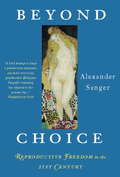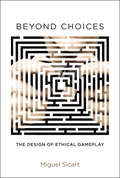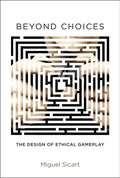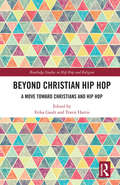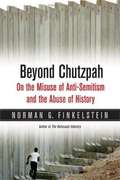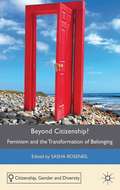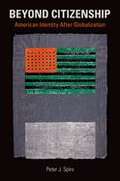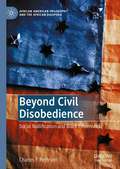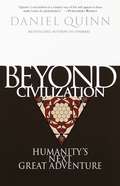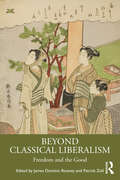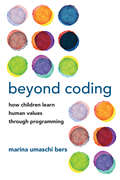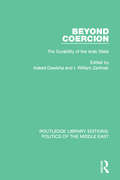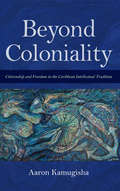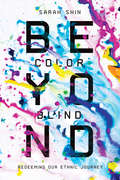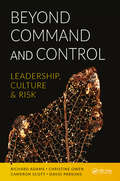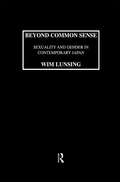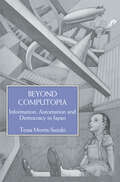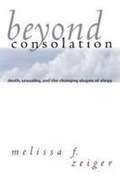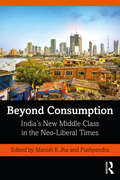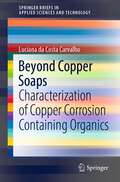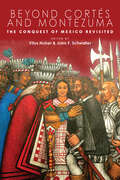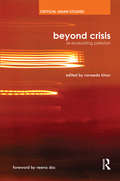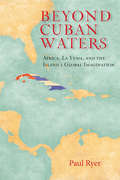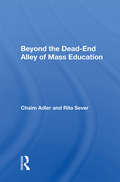- Table View
- List View
Beyond Choice: Reproductive Freedom In The 21st Century
by Alexander SangerThirty years after Roe v. Wade, the argument between "pro-choicers" and "pro-lifers" has reached stalemate. Pro-choice arguments haven't persuaded a comfortable majority that legal abortion is vital to our society, nor addressed our moral qualms. Younger people are less and less supportive of reproductive rights. Since 1996, state legislatures have enacted nearly 300 pieces of anti-choice legislation. With Roe in jeopardy, International Planned Parenthood Council Chair Alexander Sanger asks a simple but heretical question: How many more pieces of anti-choice legislation will it take to get the pro-choice movement to rethink its approach to the issue? In Beyond Choice Sanger explores the history of the reproductive rights movement to discover how it got stuck in its thinking, and then provides a convincing new argument for the moral rightness of its cause. He shows why it is vital to the health and survival of the human race that couples be able to have children, or not, when they choose; why reproductive rights are just as important to men as to women; and why, in an era of new reproductive technologies, completely unfettered choice is not morally defensible. Beyond Choice is inspiring and important reading for women's rights advocates, opinion leaders, medical ethicists, and anyone concerned to preserve our freedom to reproduce, or not, without government intervention.
Beyond Choices: The Design of Ethical Gameplay (The\mit Press Ser.)
by Miguel SicartHow computer games can be designed to create ethically relevant experiences for players.Today's blockbuster video games—and their never-ending sequels, sagas, and reboots—provide plenty of excitement in high-resolution but for the most part fail to engage a player's moral imagination. In Beyond Choices, Miguel Sicart calls for a new generation of video and computer games that are ethically relevant by design. In the 1970s, mainstream films—including The Godfather, Apocalypse Now, Raging Bull, and Taxi Driver—filled theaters but also treated their audiences as thinking beings. Why can't mainstream video games have the same moral and aesthetic impact? Sicart argues that it is time for games to claim their place in the cultural landscape as vehicles for ethical reflection.Sicart looks at games in many manifestations: toys, analog games, computer and video games, interactive fictions, commercial entertainments, and independent releases. Drawing on philosophy, design theory, literary studies, aesthetics, and interviews with game developers, Sicart provides a systematic account of how games can be designed to challenge and enrich our moral lives. After discussing such topics as definition of ethical gameplay and the structure of the game as a designed object, Sicart offers a theory of the design of ethical game play. He also analyzes the ethical aspects of game play in a number of current games, including Spec Ops: The Line, Beautiful Escape: Dungeoneer, Fallout New Vegas, and Anna Anthropy's Dys4Ia. Games are designed to evoke specific emotions; games that engage players ethically, Sicart argues, enable us to explore and express our values through play.
Beyond Choices
by Miguel SicartToday's blockbuster video games -- and their never-ending sequels, sagas, and reboots -- provide plenty of excitement in high-resolution but for the most part fail to engage a player's moral imagination. In Beyond Choices, Miguel Sicart calls for a new generation of video and computer games that are ethically relevant by design. In the 1970s, mainstream films -- including The Godfather, Apocalypse Now, Raging Bull, and Taxi Driver -- filled theaters but also treated their audiences as thinking beings. Why can't mainstream video games have the same moral and aesthetic impact? Sicart argues that it is time for games to claim their place in the cultural landscape as vehicles for ethical reflection.Sicart looks at games in many manifestations: toys, analog games, computer and video games, interactive fictions, commercial entertainments, and independent releases. Drawing on philosophy, design theory, literary studies, aesthetics, and interviews with game developers, Sicart provides a systematic account of how games can be designed to challenge and enrich our moral lives. After discussing such topics as definition of ethical gameplay and the structure of the game as a designed object, Sicart offers a theory of the design of ethical game play. He also analyzes the ethical aspects of game play in a number of current games, including Spec Ops: The Line, Beautiful Escape: Dungeoneer, Fallout New Vegas, and Anna Anthropy's Dys4Ia. Games are designed to evoke specific emotions; games that engage players ethically, Sicart argues, enable us to explore and express our values through play.
Beyond Christian Hip Hop: A Move Towards Christians and Hip Hop (Routledge Studies in Hip Hop and Religion)
by Erika D. Gault Travis HarrisChristians and Christianity have been central to Hip Hop since its inception. This book explores the intersection of Christians and Hip Hop and the multiple outcomes of this intersection. It lays out the ways in which Christians and Hip Hop overlap and diverge. The intersection of Christians and Hip Hop brings together African diasporic cultures, lives, memories and worldviews. Moving beyond the focus on rappers and so-called "Christian Hip Hop," each chapter explores three major themes of the book: identifying Hip Hop, irreconcilable Christianity, and boundaries.There is a self-identified Christian Hip Hop (CHH) community that has received some scholarly attention. At the same time, scholars have analyzed Christianity and Hip Hop without focusing on the self-identified community. This book brings these various conversations together and show, through these three themes, the complexities of the intersection of Christians and Hip Hop. Hip Hop is more than rap music, it is an African diasporic phenomenon. These three themes elucidate the many characteristics of the intersection between Christians and Hip Hop and our reasoning for going beyond "Christian Hip Hop." This collection is a multi-faceted view of how religious belief plays a role in Hip Hoppas' lives and community. It will, therefore, be of great interest to scholars of Religion and Hip Hop, Hip Hop, African Diasporas, Religion and the Arts, Religion and Race and Black Theology as well as Religious Studies more generally.
Beyond Chutzpah: On the Misuse of Anti-Semitism and the Abuse of History
by Norman G. FinkelsteinIn this sequel to his international bestseller "The Holocaust Industry", Norman G. Finkelstein moves from an iconoclastic interrogation of the new anti-Semitism to a meticulously researched expose of the corruption of scholarship on the Israel-Palestine conflict.
Beyond Citizenship?
by Sasha RoseneilBeyond Citizenship? Feminism and the Transformation of Belonging pushes debates about citizenship and feminist politics in new directions, challenging us to think 'beyond citizenship', and to engage in feminist re-theorizations of the experience and politics of belonging.
Beyond Citizenship: American Identity After Globalization
by Peter J. SpiroAmerican identity has always been capacious as a concept but narrow in its application. Citizenship has mostly been about being here, either through birth or residence. The territorial premises for citizenship have worked to resolve the peculiar challenges of American identity. But globalization is detaching identity from location. What used to define American was rooted in American space. Now one can be anywhere and be an American, politically or culturally. <p><p> Against that backdrop, it becomes difficult to draw the boundaries of human community in a meaningful way. Longstanding notions of democratic citizenship are becoming obsolete, even as we cling to them. This book charts the trajectory of American citizenship and shows how American identity is unsustainable in the face of globalization. The author describes how citizenship law once reflected and shaped the American national character. He explores the histories of birthright citizenship, naturalization, dual citizenship, and how those legal regimes helped reinforce an otherwise fragile national identity. But on a shifting global landscape, citizenship status has become increasingly divorced from any sense of actual community on the ground. <p><p> As the bonds of citizenship dissipate, membership in the nation-state becomes less meaningful. The rights and obligations distinctive to citizenship are now trivial. Naturalization requirements have been relaxed, dual citizenship embraced, and territorial birthright citizenship entrenched―developments that are all irreversible. Loyalties, meanwhile, are moving to transnational communities defined in many different ways: by race, ethnicity, gender, religion, age, and sexual orientation. These communities, the author boldly argues, are replacing bonds that once connected people to the nation-state, with profound implications for the future of governance.
Beyond Civil Disobedience: Social Nullification and Black Citizenship (African American Philosophy and the African Diaspora)
by Charles F. PetersonThis book interrogates the nature and state of African American citizenship through the prism of Social Contract Theory. Challenging the United States’ commitment to African American citizenship, this book explores the idea of Social Nullification, the decision to reject, revoke and re-define the social contract with a state and society. Charles F. Peterson surveys the history of Social Contract Theory, examines Nullification as political and legal theory, argues public policy as a measure of the state’s commitment to the contractarian relationship and frames the writings and activism of Martin R. Delany, Ida B. Wells-Barnett and the African American Reparations Movement as examples of Social Nullification and challenges to the terms of Black life in America.
Beyond Civilization: Humanity's Next Great Adventure
by Daniel QuinnIn his first work of nonfiction to build on the ideas of his "Ishmael" books, Daniel Quinn argues provocatively that civilization--a system to which we cling as it carries us toward global catastrophe--is an idea whose time has past. If humanity is to survive, we must move beyond civilization, not back to the tribal cultures that sustained our species for millions of years, but forward to a new tribal way of life that is right for our age. This new tribal culture is best exemplified by a circus whose members all work toward the same goal. In Beyond Civilization, Quinn argues persuasively that this is no utopian dream. It is a vital necessity that we must begin moving toward today. "[Quinn] shows us that getting 'beyond' the mess of civilization doesn't mean changing human nature or setting off a revolution. We only need breathe new life into an ancient human strategy for survival. Quinn's plan is inspiring & devilishly clever. " --John Briggs, author of Seven Life Lessons of Chaos.
Beyond Classical Liberalism: Freedom and the Good
by James Dominic Rooney Patrick ZollThis volume brings together diverse sets of standpoints on liberalism in an era of growing skepticism and distrust regarding liberal institutions. The essays in the volume: • Relate concerns for liberal institutions with classical themes in perfectionist politics, such as the priority of the common good in decision-making or the role of comprehensive doctrines. • Analyse how perfectionist intuitions about the political life affect our concepts of public reason or public justification. • Outline various moral duties we have toward other persons that underlie the liberal institutions or notions of rights functioning across the contemporary political landscape. • Explore various aspects of pluralism from within influential religious or philosophical traditions, applying insights from those traditions to issues in contemporary politics. The comprehensive volume will be of great interest to scholars, students, and researchers of politics, especially those in political philosophy and political theory.
Beyond Coding: How Children Learn Human Values through Programming
by Marina Umaschi BersWhy children should be taught coding not as a technical skill but as a new literacy—a way to express themselves and engage with the world. Today, schools are introducing STEM education and robotics to children in ever-lower grades. In Beyond Coding, Marina Umaschi Bers lays out a pedagogical roadmap for teaching code that encompasses the cultivation of character along with technical knowledge and skills. Presenting code as a universal language, she shows how children discover new ways of thinking, relating, and behaving through creative coding activities. Today&’s children will undoubtedly have the technical knowledge to change the world. But cultivating strength of character, socioeconomic maturity, and a moral compass alongside that knowledge, says Bers, is crucial. Bers, a leading proponent of teaching computational thinking and coding as early as preschool and kindergarten, presents examples of children and teachers using the Scratch Jr. and Kibo robotics platforms to make explicit some of the positive values implicit in the process of learning computer science. If we are to do right by our children, our approach to coding must incorporate the elements of a moral education: the use of narrative to explore identity and values, the development of logical thinking to think critically and solve technical and ethical problems, and experiences in the community to enable personal relationships. Through learning the language of programming, says Bers, it is possible for diverse cultural and religious groups to find points of connection, put assumptions and stereotypes behind them, and work together toward a common goal.
Beyond Coercion: The Durability of the Arab State (Routledge Library Editions: Politics of the Middle East #6)
by Adeed Dawisha I. William ZartmanThis volume, first published in 1988, analyses the process of stabilisation amongst the Arab states, a process that has contradicted all predictions of impending disintegration and impending collapse. Although there were some cases of disintegration, there are evidently mechanisms at work that helped consolidate the majority of Arab states and the Arab state system. Revolutions, as in Iran or the Sudan, or political collapse and disintegration, as in Lebanon, have been highly visible but nevertheless exceptions. This collection, Volume Three in the Nation, State and Integration in the Arab World research project carried out by the Istituto Affari Internazionali, focuses on the problem of explaining the stability and persistence of the state in the Arab world.
Beyond Coloniality: Citizenship and Freedom in the Caribbean Intellectual Tradition (Blacks in the Diaspora)
by Aaron KamugishaAgainst the lethargy and despair of the contemporary Anglophone Caribbean experience, Aaron Kamugisha gives a powerful argument for advancing Caribbean radical thought as an answer to the conundrums of the present. Beyond Coloniality is an extended meditation on Caribbean thought and freedom at the beginning of the 21st century and a profound rejection of the postindependence social and political organization of the Anglophone Caribbean and its contentment with neocolonial arrangements of power. Kamugisha provides a dazzling reading of two towering figures of the Caribbean intellectual tradition, C. L. R. James and Sylvia Wynter, and their quest for human freedom beyond coloniality. Ultimately, he urges the Caribbean to recall and reconsider the radicalism of its most distinguished 20th-century thinkers in order to imagine a future beyond neocolonialism.
Beyond Colorblind: Redeeming Our Ethnic Journey
by Sarah Shin• 15th Annual Outreach Magazine Resource of the Year - Also Recommended in Racial Reconciliation • 2017 Foreword INDIES Award Finalist For a generation or so, society has tried to be colorblind. People say they don’t see race. But this approach has limitations. In our broken world, ethnicity and racial identity are often points of pain and injustice. We can’t ignore that God created us with our ethnic identities. We bring all of who we are, including our ethnicity and cultural background, to our identity and work as God's ambassadors. Ethnicity and evangelism specialist Sarah Shin reveals how our brokenness around ethnicity can be restored and redeemed, for our own wholeness and also for the good of others. When we experience internal transformation in our ethnic journeys, God propels us outward in a reconciling witness to the world. Ethnic healing can demonstrate God's power and goodness and bring good news to others. Showing us how to make space for God's healing of our ethnic stories, Shin helps us grow in our crosscultural skills, manage crosscultural conflict, pursue reconciliation and justice, and share the gospel as ethnicity-aware Christians. Jesus offers hope for healing, both for ourselves and for society. Discover how your ethnic story can be transformed for compelling witness and mission.
Beyond Command and Control: Leadership, Culture and Risk
by David Phillip Parsons Richard Adams Christine Owen Cameron ScottThis book will advance the understanding of leadership beyond the inherited myths and modalities of command and control. Leadership is separated from ideas and institutional seniority and explained as the collaborative power of one with others. Enabling the intelligent co-participation of all people, the constructive effect of this approach to leadership is in the engagement of people. This is significant when task accomplishment depends not on managerial direction, but on the interaction of people with each other, with technical systems, and with complex regulations which are often across jurisdictional boundaries. Examples and case studies are included.
Beyond Common Sense: Sexuality And Gender In Contemporary Japan
by LunsingFirst published in 2001. Routledge is an imprint of Taylor & Francis, an informa company.
Beyond Computopia
by Tessa Morris-SuzukiFirst published in 1988. Routledge is an imprint of Taylor & Francis, an informa company.
Beyond Consolation: Death, Sexuality, and the Changing Shapes of Elegy
by Melissa F. ZeigerUsing as her starting point the story of Orpheus and Eurydice, Melissa F. Zeiger examines modern transformations of poetic elegy, particularly as they reflect historical changes in the politics of gender and sexuality.
Beyond Consumption: India’s New Middle Class in the Neo-Liberal Times
by Jha K PushpendraThis book analyses India’s middle class by recognising the diversity within the class, the people, their practices, and the production of spaces. It explores the economic and social lives of the new middle class, expanding the areas of inquiry beyond consumption in post-liberalisation India and its intersectionalities with gender, caste, religion, migration, and other socioeconomic markers in various cities across the country. The book interrogates the meanings and perceptions of social mobility, growth, consumerism, technology, social identity, and development and examines how they can be emancipatory or subjugating in different contexts. It engages with the new entrants in the middle class, particularly from the marginalised sections, their struggles, insecurities, anxieties, agency, and experiences. The personal, emotive, and psychic dimensions of social mobility have been dealt with in the larger context of socioeconomic settings. The book crosses disciplinary and spatial boundaries and uses a variety of methodologies to provide perspectives on several unexplored or underexplored areas of India’s new middle class. This book will be of interest to scholars and researchers of sociology, economics, development studies, public policy, and South Asian studies.
Beyond Copper Soaps: Characterization of Copper Corrosion Containing Organics (SpringerBriefs in Applied Sciences and Technology)
by Luciana da CarvalhoThis book reports a series of electrochemical experiments where copper was corroded in the presence of various organic substances. Combining data from spectroscopy techniques, X-ray diffraction and mass spectrometry (including proteomics) the experiments demonstrate that copper-organic complexes can be formed during the corrosion of copper. The low solubility of copper-organic complexes in organic solvents and their amorphous nature mean that these compounds cannot be easily detected by one single analytical technique. This book benefits researchers investigating the presence of organic residues in archaeological copper corrosion and copper-organic complexes in art, where sampling is often subject to curatorial constraints.
Beyond Cortés and Montezuma: The Conquest of Mexico Revisited (IMS Culture and Society)
by Vitus Huber John F. SchwallerBeyond Cortés and Montezuma examines both European and Nahuatl texts and images that shed light on the complex narrative of contact and the ensuing conflict, negotiation, and cooperation that continued well after the colonial period. A diverse group of scholars from Europe, Mexico, and the US with varied methodological backgrounds—linguistics, history, art history, and cultural studies—query the “conquest,” or rather conquista, of Mexico through a series of case studies that interrogate how historians, especially in Europe, Mexico, and the US, understand and interact with this concept. They consider the language used to encapsulate the event in Nahuatl documents from the colonial period, how the Spanish veterans led the transition to settlement in taking land for themselves, and the legacy of the conquista in discrimination against Tlaxcallans in modern Mexico. Beyond Cortés and Montezuma is a compilation of nuanced reflections on the language, narratives, and memories of the conquista that balances the crimes of Spanish colonialism and asymmetries of power that existed within early New Spain with the abilities of Native peoples to resist, negotiate, and survive.
Beyond Crisis: Re-evaluating Pakistan (Critical Asian Studies)
by Naveeda KhanThrough the essays in this volume, we see how the failure of the state becomes a moment to ruminate on the artificiality of this most modern construct, the failure of nationalism, an opportunity to dream of alternative modes of association, and the failure of sovereignty to consider the threats and possibilities of the realm of foreignness within the nation-state as within the self. The ambition of this volume is not only to complicate standing representations of Pakistan. It is take Pakistan out of the status of exceptionalism that its multiple crises have endowed upon it. By now, many scholars have written of how exile, migrancy, refugeedom, and other modes of displacement constitute modern subjectivities. The arguments made in the book say that Pakistan is no stranger to this condition of human immigrancy and therefore, can be pressed into service in helping us to understand our present condition.
Beyond Cuban Waters: Africa, La Yuma, and the Island's Global Imagination
by Paul RyerTwenty-first century Cuba is a cultural stew. Tommy Hilfiger and socialism. Nike products and poverty in Africa. The New York Yankees and the meaning of "blackness." The quest for American consumer goods and the struggle in Africa for political and cultural independence inform the daily life of Cubans at every cultural level, as anthropologist Paul Ryer argues in Beyond Cuban Waters. Focusing on the everyday world of ordinary Cubans, this book examines Cuban understandings of the world and of Cuba's place in it, especially as illuminated by two contrasting notions: "La Yuma," a distinctly Cuban concept of the American experience, and "África," the ideological understanding of that continent's experience. Ryer takes us into the homes of Cuban families, out to the streets and nightlife of bustling cities, and on boat journeys that reach beyond the typical destinations, all to better understand the nature of the cultural life of a nation.This pursuit of Western status symbols represents a uniquely Cuban experience, set apart from other cultures pursuing the same things. In the Cuban case, this represents neither an acceptance nor rejection of the American cultural influence, but rather a co-opting or "Yumanizing" of these influences.
Beyond Cuban Waters: Africa, La Yuma, and the Island's Global Imagination
by Paul RyerTwenty-first-century Cuba is a cultural stew. Tommy Hilfiger and socialism. Nike products and poverty in Africa. The New York Yankees and the meaning of "blackness." The quest for American consumer goods and the struggle in Africa for political and cultural independence inform the daily life of Cubans at every cultural level, as anthropologist Paul Ryer argues in Beyond Cuban Waters. Focusing on the everyday world of ordinary Cubans, this book examines Cuban understandings of the world and of Cuba's place in it, especially as illuminated by two contrasting notions: "La Yuma," a distinctly Cuban concept of the American experience, and "África," the ideological understanding of that continent's experience. Ryer takes us into the homes of Cuban families, out to the streets and nightlife of bustling cities, and on boat journeys that reach beyond the typical destinations, all to better understand the nature of the cultural life of a nation. This pursuit of Western status symbols represents a uniquely Cuban experience, set apart from other cultures pursuing the same things. In the Cuban case, this represents neither an acceptance nor rejection of the American cultural influence, but rather a co-opting or "Yumanizing" of these influences.
Beyond The Dead-end Alley Of Mass Education
by Chaim AdlerThis book deals with the realm of education-getting beyond the dead end of mass education-in the context of Israeli education system. It analyzes the aims and target populations of educational fostering and illustrates the dead-end situation of the educational system.
